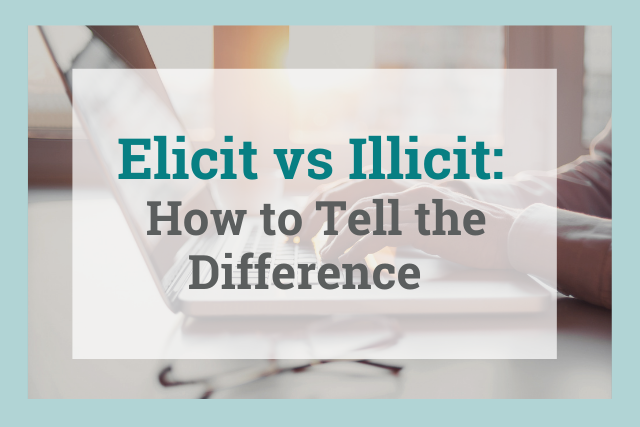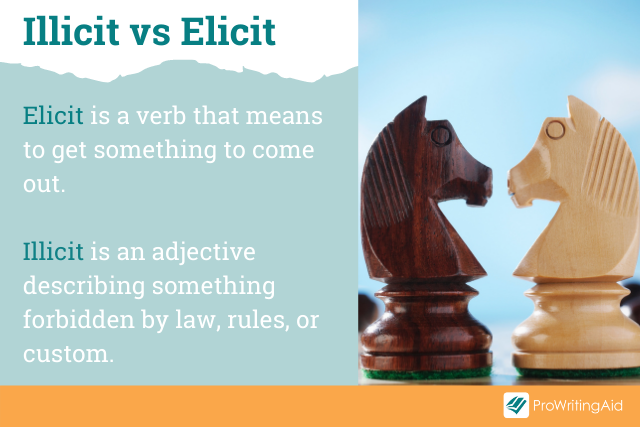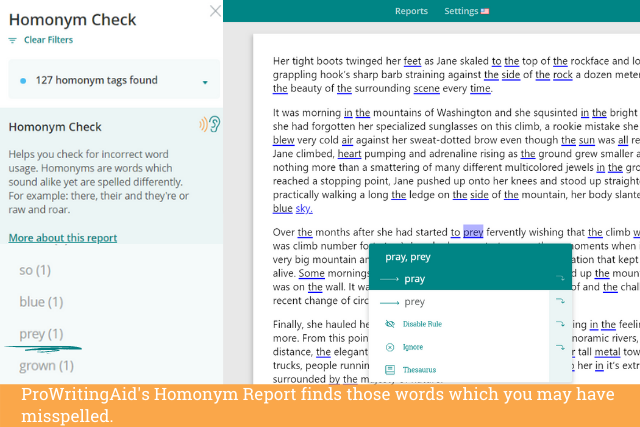
The words illicit and elicit are often confused by writers. In this article, we explain the difference between them.
Elicit means to evoke, educe (emotions, feelings, responses, etc.); to generate, obtain, or provoke as a response or answer when used as a verb.
Illicit means not approved by law, but not invalid when used as an adjective.
Elicit and illicit are commonly confused words. They sound similar, but they differ in meaning and usage.
How to Tell Elicit from Illicit
Elicit is a verb that means “to get something to come out.”
Illicit, instead, is an adjective describing something forbidden by law, rules, or custom.
Both words belong to a group known as homophones. These two words are often confused because they sound similar. So understanding their meaning will help you determine how to use them in your writing without making an error.
Look at the two words used in the same sentence.
- Jake reviewed the quarterly reports, called the CFO, and elicited a jumbled response to the illicit transactions in operations.
You can tell trouble is ahead for Jake, accounting, operations, and possibly the CFO. That is because the CFO response Jake evoked raised more questions about the illegal transactions.

What Does Elicit Mean?
Elicit is a transitive verb with meanings like to draw forth, evoke, or cause to be revealed.
As an action verb, someone performs the action. For example:
- Gary elicits answers from his students every day.
As elicit is a transitive verb, a noun that receives the action of the verb must always follow it. That noun is the object of the action.
In the sentence above, answers is the object of the verb. So you can think:
- Gary draws out (action) answers (object of verb) from his students.
The word elicit comes from the Latin verb elicere: to draw out or entice. The English spelling is based on the Latin past participle spelling elicitus.
So, you can use the verb elicit when you want to describe the action of drawing out or evoking something.

How to Use Elicit
The verb elicit is perfect for showing action that evokes a response or reaction.
When the turtle, Clyde, needed a wading pool to stay indoors after surgery, his owner's request elicited a number of generous offers. (response)
The detective asked one last question that elicited the tearful confession. (reaction)
You can also use elicit to refer to getting information.
- He had to ask the right question to elicit the dates from the reference librarian. (information)
Examples of Elicit in Sentences
Here are some examples of elicit used in sentences:
Clara thought it was important to elicit a suitable response from the team members at each meeting.
Try as he might, George could not elicit excitement in the chemistry lab.
It is difficult to elicit sympathy for a spiteful old woman submerged in backhanded dealings.
She asks him questions about work, more to take his mind off the current troubles than to elicit information.
She sorted through her button collection to elicit combinations that looked striking on the dress.
Depending on the role, a job in video-game design can elicit different pay scales.
Her favorite monologue was Lady Macbeth's when she elicits the evil spirits to guide her actions.
Consider telling jokes or using amusing props to elicit a smile when working with middle-grade students.
Joseph Haydn wrote the "Surprise Symphony" to elicit attention from bored audiences.
Every morning when the birds sang, they elicited feelings of joy as he drank his first cup of coffee.

This example should elicit a smile:
- The key to a humorous retirement gift is that it should elicit laughter, whether in the form of a chuckle, a belly-shaking laugh, or a snorting giggle.
As you think of ways to remember how to tell elicit from illicit, remember that elicit is a verb calling for action. The person who performs the action wants to get a response, reaction, or information.
Synonyms for Elicit
One good way to check your meaning for a word in a sentence is to think of synonyms. If you are thinking about using the word elicit, consider using a synonym.
Here are some examples:
- bring out
- evoke
- extort
- extract
- obtain
- wring
- bring
- evince
If your sentence still makes sense with one of these, you have the right word.
What Does Illicit Mean?
The word illicit may sound like elicit but the usage and meaning are not related at all.
Illicit is an adjective that describes a noun—a person, place, or thing. And its meaning implies something that is not socially approved. It may be illegal, outside the law. And that is common usage in American English.

The origin comes from the Latin, illicitus, meaning "not allowed." But the direct origin comes from the old French, illicite, meaning "unlawful, forbidden" which is how the word came into English usage.
It also has a more broadly social or moral connotation as well. Whether or not there is a legal proscription, something can be illicit if it is outside a custom or rule. Something can be illicit if it is not socially approved.
Aside from implying something is unlawful, you can construe something illicit if it is prohibited by social custom or unauthorized.
For example:
An 18-year-old college student lives in a state where the legal drinking age is 18. But his college does not allow alcohol on campus.
If he and his buddies drink in the dorm, that is an illicit activity on campus, even though it is legal in the state.
So, you can use the word illicit to describe something that is legal but still not approved.
How to Use Illicit
You can apply illicit as an adjective to describe things like activities or substances or places. Use illicit when it makes sense to apply a sense of being out of bounds.
For example:
That party was illicit and a clear violation of the school's policy that stated drinking should not take place on campus. (activity)
The Coast Guard stopped the yacht carrying illicit drugs and confiscated the boat and everything on it. (thing)
In the small town, even though Josh and Cecilia were single, their affair was illicit in the eyes of the villagers. (social custom)
When Lolita was published, the material was considered shocking because of the illicit affair with a pedophile. (moral)
When you want to imply a sense of being outside approved norms, use illicit to describe the noun.
Examples of Illicit in Sentences
Here are examples of illicit used in sentences.
In the United States, although cannabis remains illicit as a Schedule I drug, the Rohrabacher–Farr amendment prohibits federal prosecution of individuals complying with state medical cannabis laws.
Jake left his girlfriend because of her illicit drug use.
After the church vestry discovered the minister's illicit affair, they asked him to leave.
She was afraid of an illicit DDoS attack on the unverified new system.
ABC's venal president had no qualms about engaging in illicit practices to augment his annual bonus.
Drugs, alcohol, and weapons are all illicit inside the prison.
She wondered if it was illicit to carry an apple as a snack on her transatlantic flight.
Words considered illicit in Victorian times are in common usage in publications today.
Amelia, wanting to get back at her parents, engaged in every illicit activity she could find.

Synonyms for Illicit
Once again, try inserting a synonym in your sentence to test if using illicit makes sense in the sentence context.
Here are some synonyms for illicit:
- clandestine
- furtive
- illegal
- illegitimate
- immoral
- improper
- prohibited
- unauthorized
Check Your Homophones
Words that sound alike but are spelled differently and have different meanings are classified in grammar as homophones. It's easy to confuse the similar sounds of a short e and short i, especially in American English.
When you are unsure in your writing, ProWritingAid's Homonym Report helps you spot incorrect usage. It covers spelling and sound confusions that can pop into your writing.
The challenge of words that sound alike but have different meanings and spellings keeps you on your vocabulary toes when you write.

Elicit vs. Illicit
There you have it. The difference between elicit (a verb) and illicit (an adjective). Think about how you use each word in context to mean the action of calling out or a description of inappropriate or illegal activity.
Remember that elicit is always an action and illicit always describes something else.
Once you have each word incorporated into your vocabulary, you'll find you'll know the right word to use in your writing.

